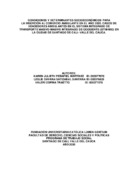Condiciones y determinantes socioeconómicos para la inserción al comercio ambulante en el año 2020. Casos de vendedores ambulantes en el sistema integrado de transporte masivo-masivo integrado de occidente (Sitm-Mio) en la ciudad de Santiago de Cali- Valle del Cauca.
Resumen
Partiendo de la teoría cognitiva social y de las necesidades del desarrollo humano planteadas por Bandura (1977) y Max Neff (1968), respectivamente, la presente investigación permitió analizar las condiciones y los determinantes socioeconómicos de la inserción laboral de los trabajadores informales para el comercio ambulante localizado en el Sistema Integrado de Transporte Masivo (SITM-MIO) de la ciudad de Santiago de Cali en el año 2020, aplicando un enfoque metodológico de tipo mixto (cuantitativo y cualitativo) a través del diseño del instrumento (encuesta y entrevista semi-estructurada), el cual fue implementado en la estación de unidad deportiva dado que es un punto de encuentro clave para los vendedores ambulantes, debido a esto se recolectó los datos que dieron paso a conocer las condiciones socioeconómicas del vendedor ambulante frente a su caracterización socioeconómica que da paso a los determinantes socioeconómicos como el desempleo y la falta de oportunidades, que es una de las razones por la cual el vendedor informal decide ser parte del comercio ambulante, teniendo en cuenta que estas razones van entrelazadas con las necesidad básicas del vendedor.
Abstract
Based on the social cognitive theory and the needs of human development proposed by Bandura (1977) and Max Neff (1968), respectively, the present research allowed analyzing the conditions and socioeconomic determinants of informal workers' labor insertion for street commerce located in the Integrated System of Massive Transport (SITM-MIO) of the city of Santiago de Cali in 2020, applying a methodological approach of mixed type (quantitative and qualitative) through the design of the instrument (survey and semi-structured interview), which was implemented at the sports unit station since it is a key meeting point for street vendors, due to this data was collected that gave way to the socio-economic conditions of the street vendor as opposed to its socio-economic characterization which gives way to socio- economic determinants such as unemployment and lack of opportunities which is one of the reasons why the informal vendor decides to be part of the street trade, taking into account that these reasons are intertwined with the basic needs of the vendor.
Colecciones
- Trabajo social [101]

